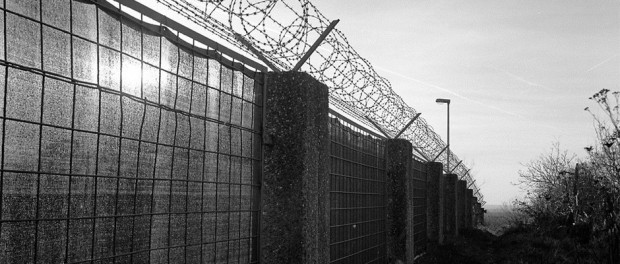On the Boundaries of Sin

The nonbeliever often perceives Christianity as being a set of arbitrary rules and regulations to follow to meet some equally arbitrary goal that permits some reward called “heaven” after one’s death. The mature believer, apart from knowing no obedience to a set of rules (arbitrary or not) is enough for heavenly rewards, recognizes the Law of God to be not arbitrary at all. Rather, His rules are for our best interests.
The same motivation for state laws against driving while intoxicated or familial rules against touching that hot stove also drive God’s prohibitions against theft or deceit. These boundaries of sin, these rules, are best for you and for everyone else.
Now, we as Christians no longer live governed by the letter of the Law; we can eat bacon now. Thank you, Jesus. However, the Spirit of the Law now resides within us, so it’s now a more intimate, more personal experience (see Romans 7:6).
When I willingly and knowingly cross a moral boundary, I’m in sin.
The ramifications of this are far-reaching.
Listening Intently
For one, I must strive to listen to the Holy Spirit in me intently. After all, Jesus teaches me to seek first the Kingdom of God and His righteousness (Matthew 6:33). Everything in life must go through that same filter: “What does this do for the Kingdom, and does it affect my righteousness?”
Nothing I do or face or encounter gets to trump this one thing, or else I’m not truly seeking it first.
This is fairly simple in concept, though it can take some effort to implement in real life. Putting God first isn’t easy for anyone at first, but it does get habitual over time.
Preach the Gospel, Not My Convictions
Second, I must do everything I can to ensure my witness, my evangelism, my preaching is about the Gospel rather than my convictions. This is a hang-up for many Christians. I can’t afford to make mountains out of mole hills when Christ is the only mountain.
I can’t afford to make mountains out of mole hills when Christ is the only mountain.
Now, there’s no harm in sharing it with you in the appropriate context. Perhaps you ask my opinion, or you read my blog post. But when someone’s eternal destiny is at stake, you can bet I’m focusing on the only thing that matters: Jesus.
Confronting Boundaries
Third, and perhaps most difficult, I must ensure the boundaries in my life are based on truth, that they’re doctrinally sound. I can’t merely set my life’s rules based on what I feel about a subject. My gut reaction is has often been superseded by God’s word or a check in my spirit. Or both. I don’t get to just go off what I think the right thing to do is, or what I’d really like it to be. I need to know, as James said.
This knowing is more than mere intellectual awareness, like I know the sky is blue. The Greek word for that is ŏptŏmai, which looks like the English word “optic” for a reason. It’s awareness based on observation. I see the sky is blue, so I know (ŏptŏmai) the sky is blue.
I must ensure the boundaries in my life are based on truth, that they’re doctrinally sound.
So, as I live out my Christian walk, I must regularly confront boundaries. What to do. What not to do.
These might be as shaky as an unwritten social code of conduct for taking the last donut at the office, but they may also be fixed laws like proscriptions against murder–reinforced by state, Federal, and God’s own Law. For all the above, though, I’m held accountable not just for God’s written standard but also what I know (ĕidō), so I must make sure I’ve given the rule genuine prayer and consideration.
Informed Principles
Now, I don’t pray about opening a door for a woman every time one passes by; I just do it. You may consider it gentlemanly or chauvinistic, but this comes from a conviction I already have to honor women. And that conviction, that principle, that boundary, comes from prayer and consideration. From study. From seeking and trusting God to be found.
And thankfully, there’s a great method for assessing boundaries and any other potential truth. Next time, I’ll introduce the details of the process I use to find truth and confront boundaries to determine their validity.
Originally posted 2015-02-23 08:00:42.


Leave a Reply